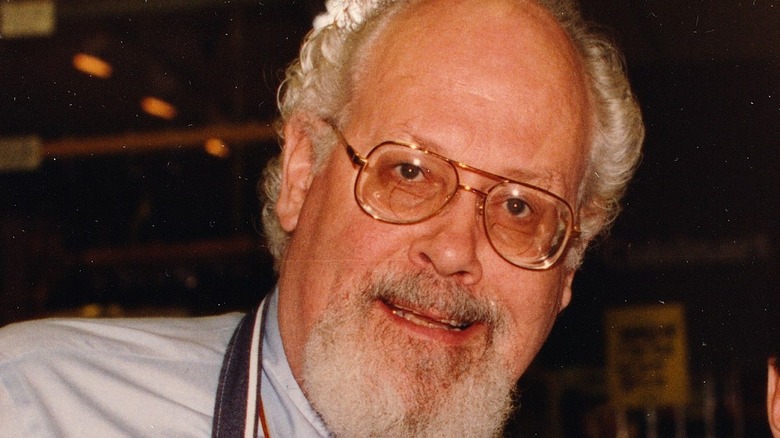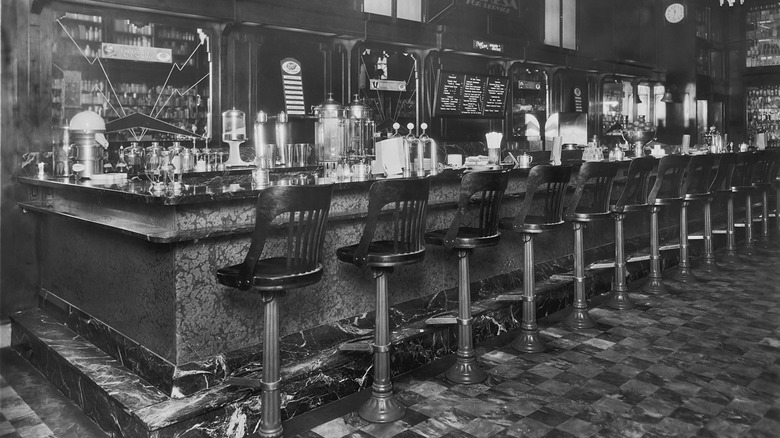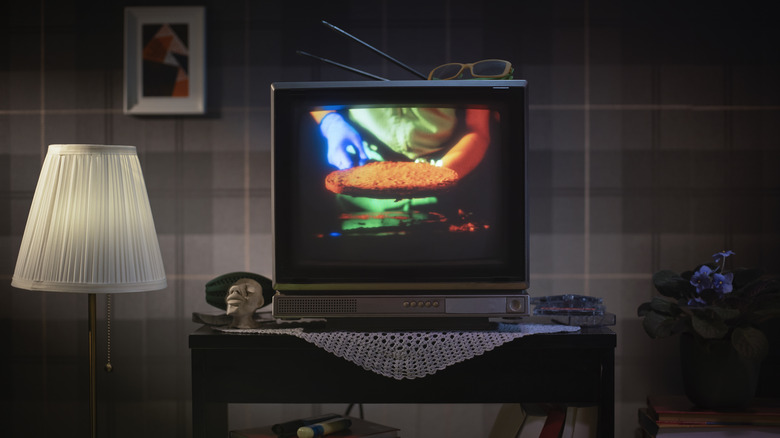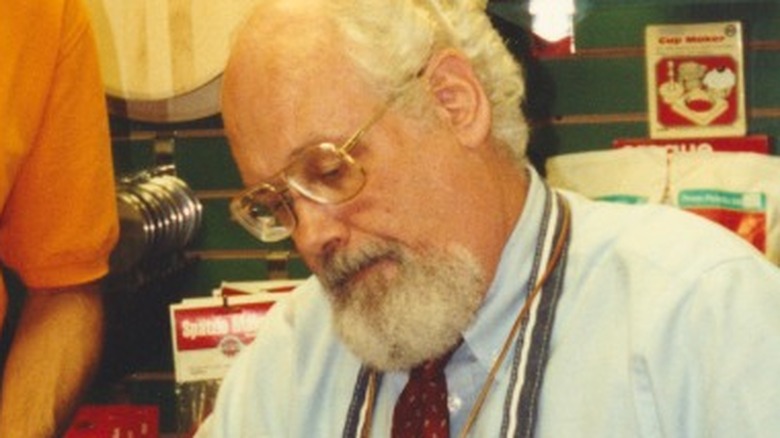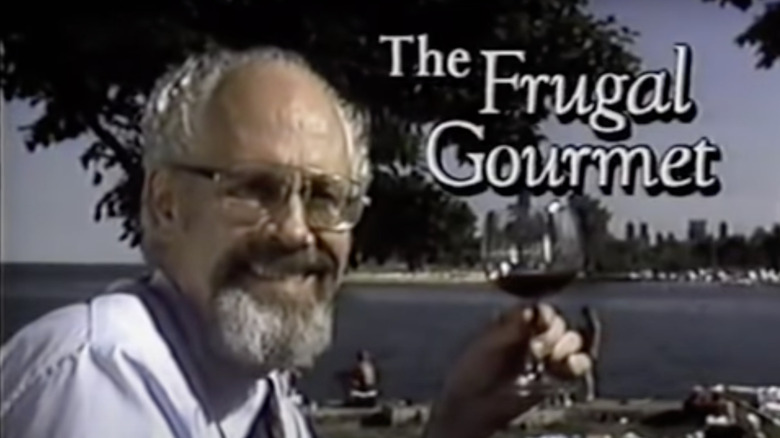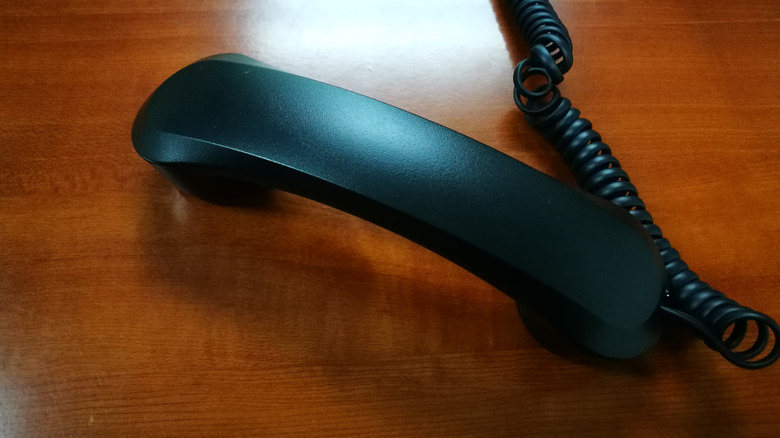The Shameful Downfall Of The Frugal Gourmet
This article discusses allegations of sexual abuse. If you or anyone you know has been a victim of sexual assault, help is available. Visit the Rape, Abuse & Incest National Network website or contact RAINN's National Helpline at 1-800-656-HOPE (4673).
Jeff Smith's "The Frugal Gourmet" became wildly popular in the '80s and early '90s, but after 14 years, PBS canceled his show amid a scandal. From the beginning, Smith was not a typical TV chef. Fame came to him after heart surgery, when he was in his mid-forties, and he was not young, shiny, and glamorous like contemporary Wolfgang Puck. Smith was balding with white tufts of hair on the side and a fluffy Santa Claus beard and had no formal training — rather he was an ordained Methodist minister.
Millions of viewers loved Smith, though, because when he talked about food on camera, he'd get so excited he'd trip over his words and gesticulate wildly. He often featured recipes from different cultures and taught his audience to prepare them. In every episode of his show, he transmitted a loving grandfatherly vibe and his sign-off was, "I bid you peace."
Smith's biggest critics disliked his shameless self-promoting of merchandise and how he misrepresented cooking processes on his show. He said they were just jealous because he'd gotten successful without being a part of the traditional cooking show establishment. They didn't know there was a darker reason to be suspicious of the celebrity. Over the years, rumors said his behavior off-camera was different from his public image, and there'd long been whisperings of misdeeds. Even so, it took decades and a lawsuit until anyone paid attention. Smith's fall from fame is, in some ways, a cautionary tale of how the system failed his alleged victims.
Jeff Smith's first job was baking at Pike Place Market in Seattle
Smith never trained as a chef, but he was always in kitchens, even as a child, and he loved watching his mother cook. In a 1998 interview, saved in the Seattle Archives, Smith recalled getting his first job in a kitchen as a teen in Pike Place Market, one of the city's most important historical sites. Smith explained that he began washing pans at Rotary Bakery, there, around 1953, when he was 15. Then, he was promoted to doughnut cook, and, later, he decorated cakes. He funded his college education by attending Brehm's Delicatessen at age 17.
Throughout Smith's life, this market was his reference point. In junior high, he would lie to his mother and take the bus there to watch people. She had prohibited it because the market was a scuzzy area in the '50s. Much later, as a famous TV cook, he had his test kitchen there, although PBS filmed the show in Chicago, so Smith traveled back and forth.
After his career ended, Smith stayed in his Pike Place condominium until he died in his sleep in 2004. Throughout the '90s and early 2000s, neighbors saw him walking the area daily until an ankle surgery forced him to make the same circuit on a motor scooter wheelchair. By that time, he'd lost his show, fortune, and good reputation, but got to spend his final years doing as he liked in a place he loved.
He would later teach at an area university
In 1966, University Puget Sound (UPS) in Tacoma, Washington hired Smith to teach religion and act as the campus chaplain when he was in his late 20s. In an interview with Entertainment Weekly, Smith said of his students: "None of them were eating properly. They were eating fried celery and brown rice, garbage like that. So I started giving cooking lessons." Those lessons became the class, "Food as Sacrament and Celebration."
Today, the UPS website doesn't mention Smith beyond brief references in yearbooks and old copies of the student newspaper, Sound Ideas. In the 1988 yearbook, one alum recalls Smith's Greek-themed Sunday services featuring food and dancing. A newspaper article also shows him inspecting pipes for a new organ for the chapel.
Later, a lawsuit filed in Pierce County's Superior Court, alleged Smith used his position to pressure male students into sex and named a pupil who also babysat for the Smith family. Allegedly, the campus chaplain attacked him repeatedly in their home. It's unclear if his wife, Patty, knew what was going on. The plaintiffs claimed that because of the location of the alleged crime — her marital bed — she must have, but covered for her husband. When the plaintiffs filed the lawsuit, she denied knowledge of her husband's conduct.
Early accusations of sexual misconduct were traced back to his first restaurant
In 1972, Smith left UPS to open a restaurant and specialty food shop called The Chaplain's Pantry in Tacoma, Washington with former students. It worked as a lunchtime deli, but patrons could make dinner reservations for up to 25 people. Customers could select a cuisine, and Smith created a menu accordingly. Locals loved dining there because of the multi-ethnic foods on the menu.
In 1997, one of Smith's restaurant guests was a witness in the lawsuit filed against the cook. The man alleged he'd seen something upsetting when dining at the Chaplain's Pantry with a church group in the 1970s. He'd wanted to purchase peppercorn from Smith, but, while looking for the gourmet shop, he accidentally stumbled into the dishwashing room. There, the busboy was laying on a table while Smith stood, kissing him and touching the boy's crotch. This witness remained silent for years.
Further allegations signaled the incident was not a love affair between the cook and dishwasher, but part of a pattern of grooming. Smith's restaurant coordinated with Stadium High School as part of a career training class. Pupils worked in the Smith's deli for academic credit, and several of them later alleged that the owner used alcohol and threats to sexually assault them. In retrospect, it seems Smith likely positioned himself thus to have power over his alleged victims and continue these attacks without outside interference.
Smith's first TV show, Cooking Fish Creatively, debuted in the early 1970s
In 1973, Smith had his first foray into television. Noting the success of his restaurant, the local PBS channel, KTPS, hired him to host a cooking show, "Cooking Fish Creatively." In an interview with Entertainment Weekly, the cook recalled having to go around and ask vendors in local markets for free fish since the budget was so small. The set was nothing special — just a brick wall, counter, and ugly refrigerator, but, no matter the simplicity, Smith liked the camera and the camera liked Smith. Then, his wife, Patty, suggested renaming the show, "The Frugal Gourmet," and a legend was born.
The experience Smith gained at KTPS would make him famous later. Reruns of these early shows inspired PBS Chicago to film new seasons of "The Frugal Gourmet." Additionally, KTPS put the cook in the local spotlight, setting the stage for him to write and self-publish a collection of recipes. He could publicize his cookbook through his shows and sell it personally at his restaurant.
Debt from heart surgery pushed Smith to close his restaurant
Smith's carefully constructed Tacoma empire tumbled down in 1981 when he was in his early 40s. The primary problem was that the cook needed expensive heart valve surgery and went into debt to pay for it. Then, the same year, an 18-year-old employee of the Chaplain's Pantry, named Clint Smith (no relation), embezzled funds from the restaurant's business account. Smith filed his complaint with the police and a judge sentenced Clint to jail for 48 months. Later, the young man would allege he had committed the crime to get even with his boss, but, at the time, both the police and court appeared ignorant of any other criminal matters at the restaurant.
Smith found himself in dire financial straits, and, in 1982, his only option was to sell the Chaplain's Pantry. Even after the transaction, Smith still owed $70,000. The cook couldn't sleep at night because of his money problems and he felt so distraught about losing his business he contemplated suicide. He would rise again, though, and to much greater fame than he could have predicted.
If you or anyone you know is having suicidal thoughts, please call the National Suicide Prevention Lifeline by dialing 988 or by calling 1-800-273-TALK (8255).
Book sales helped to make Smith a wealthy man
Smith got lucky when a Chicago station showed reruns of his modest, low-budget cooking show from Tacoma. These got so much viewership that Phil Donahue invited the budding celebrity onto his talk show. There, Smith presented his self-published, spiral-bound, locally-printed cookbook. Over the next weeks, viewers mail-ordered 45,000 copies at $4.75 per unit. His financial troubles became a thing of the past.
Those sales numbers got William Morrow & Company interested and, in 1984, they published Jeff Smith's "The Frugal Gourmet" in a hard-cover edition. When they published his second volume, both cookbooks were on the New York Times bestsellers list in first and second place at the same time. Smith wrote a total of 12 and sold more than seven million cookbooks total. Despite their popularity with readers, critics from Harper's Magazine and Newsweek gave the books poor reviews. They claimed he plagiarized some recipes (which was never proved), and said he used his books to unabashedly sell his line of kitchenware.
Today, you can still purchase his cookbooks on Amazon, which range in price from a couple of dollars to around $40. Some of them can be purchased new while others are only available used. Although they were wildly successful when published, today, most people seem to have forgotten Smith's books, instead favoring books like the "Joy of Cooking" and "Mastering the Art of French Cooking."
The Frugal Gourmet TV show goes national
Smith's big break came when WTTW-TV created a new series with Smith as the star after his interview with Phil Donahue. They broadcasted the show nationally and audiences loved the middle-aged star. At the height of its popularity, the show had 15 million viewers a week, and social scientists attributed this to his middle-class appeal — he featured simple dishes with ingredients available to most people.
Other cooking shows at the time tended to show more elaborate recipes intended for higher society, but Smith made cooking accessible to everyone. The steps he described were simple and he seemed to want everyone to enjoy eating. His show was so appealing that a large number of children watched it and even Elmo occasionally made guest appearances.
Smith needed some help though. People noticed he occasionally used false information and made mistakes while filming. So, he hired a professional chef, Craig Wollam, to assist him on his show and in writing his books. Wollam was well on his way to becoming famous in his own right, but when Smith ran into trouble, the young man's career as a celebrity chef ended. In the beginning, Smith traveled back and forth between Seattle and Chicago. He filmed for three months a year in the windy city but tested out new recipes in his Seattle kitchen. In 1991 production moved back to Seattle and just two years later Smith's misdeeds would come back to haunt him.
The first accusations against Smith were ignored
In 1993, Smith heard the first whisperings of trouble, but everything seemed under control. Former employee, Clint Smith, was rocking the boat. The result was easy to predict, though — Smith was an established, well-loved TV personality while Clint was an ex-convict. It was the word of a minister against that of a criminal. It was easy to believe Clint was simply out to get Jeff back for reporting his theft to the police.
Clint wasn't easily deterred, though. He'd been around town, talking to at least five Seattle newspapers, alleging Smith had molested him when he worked in the Chaplain's Pantry as a teenager. His story was that the celebrity had agreed to pay him and another alleged victim $3 million for their silence. They had received cashier's checks for large amounts in 1991, but the payments stopped. Clint produced the checks as evidence when he spoke to reporters. No newspaper ran the story, though, because the checks didn't show the source of the money.
Mike Siegel aired accusations against Smith on the radio
Clint Smith persisted in his quest for justice. He continued to search for anyone and everyone who would listen to his story. That took him to Mike Siegel's radio show in 1995 where he alleged on air that Smith had abused him as a teenager. As he recounted what had happened, another alleged victim heard his story and called in to allege he had the same experience.
Smith laughed off the accusations, calling them ridiculous. No action was taken against him by his TV producers or by the law and newspapers barely paid attention. It didn't help that Mike Siegel was considered controversial, or that KVI canceled the host's show just months later because he spread unsubstantiated rumors about Seattle Mayor Norm Rice.
While calling into the radio did not ease Clint's trauma, it had an important outcome — the other alleged victim who had called in decided to take action. He had discovered he wasn't alone in what had happened to him and he didn't want to keep his secret any longer.
More victims would come forward and file a lawsuit against Smith
Things came to a head in 1997 when seven men filed a lawsuit against Smith. One of the alleged victims — a 36-year-old man with a family — said he'd struggled with emotional and behavioral disorders after the alleged attacks in his teenage years and had attempted suicide. Then, he heard Clint Smith on the radio and felt inspired to act. Clint, the most vocal of the accusers, did not join the lawsuit.
None of the plaintiffs ever reported Smith to the police or filed criminal charges against him. After 20 years, the statute of limitations meant six of them no longer could since the crimes had occurred in the '70s — those Washington laws changed in 2019. The remaining plaintiff alleged that Smith raped him after picking him up as a hitchhiker in 1992, but chose to join the civil lawsuit instead of pursuing criminal charges. The men hoped that by joining ranks, they would be heard and believed. Although their lawsuit sought financial reparations, their main motivation was to prevent Smith from ever harming another young man.
Smith settled outside of court, but lost his TV show
In the end, the lawsuit never went to court. Just days before its date, Smith and his insurer settled with the plaintiffs. This settlement included no admission of wrongdoing or apology. Until he died six years later in 2004, Smith denied the allegations. Smith also never appeared on TV again as the Frugal Gourmet — his career as a chef had come to a shameful end. The payout to the plaintiffs likely reduced his fortune greatly, although the numbers were never publicized. He spent the rest of his life wandering around the Pike Place Market and Seattle seafront, mostly on his own.
Whether he should have or not, Smith had an impact — he changed the way people watched cooking on TV. In the end, though, Smith's influence is a null point — any contribution he made could never balance out the damage he caused. Although he didn't suffer consequences equal to his alleged crimes during his life, people will never remember him with the same fondness as they have for other celebrity chefs like Julia Child or Anthony Bourdain.
